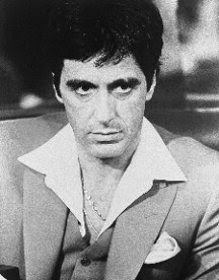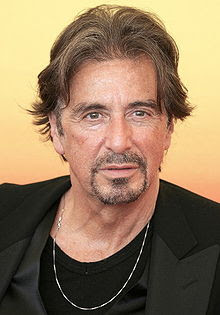
Alfredo James 'Al' Pacino was born on April 25, 1940, in East Harlem, Manhattan, as the son of Salvatore Alfred Pacino and Rose Pacino (née Gerardi) who divorce when he was two years old. His father moved to Covina, California, working as an insurance salesman and owner of Pacino's Lounge restaurant (which closed in 1992), and his mother moved to the South Bronx.
The young Al Pacino's acting interest soon blossomed into a full-time career. He dropped out of school at the age of 17, then attended a High School of Performing Arts, a division of the Fiorello H. La Guardia High School of Music and the Arts in New York City. During his early days of acting career pursue, Pacino went through a lengthy period of depression and poverty. To finance his acting studies he worked at any low-paying jobs, including janitor, messenger boy, and postal clerk, but was frequently unemployed and homeless, and sometimes had to sleep on the street, in theaters or at friends' houses. He also sometimes having to borrow bus fare to make it to auditions.

Pacino then joined the Herbert Berghof Studio (HB Studio), where he met acting teacher Charlie Laughton, who became his mentor and best friend. In 1966, Pacino studying under legendary acting coach Lee Strasberg, creator of the Method Approach that would become the trademark of many '70s-era actors, and who later became his co-star in the Godfather part II as jewish gangster Hyman Roth.
In 1968, Pacino starred in Israel Horovitz's The Indian Wants the Bronx at the Astor Place Theater. Pacino won an Obie Award for Best Actor for his role, with John "Fredo Corleone" Cazale winning for Best Supporting actor.
Pacino made his Broadway theatre debut on February 25, 1969 in Don Petersen's Does a Tiger Wear a Necktie? at the Belasco Theater. Pacino won the Tony Award for his role on April 20, 1969. During the same year he also made a brief screen appearance in an independent film Me, Natalie, released on July 1969.
Pacino's role in 1971 film The Panic in Needle Park bring him to the attention of Francis Ford Coppola, who cast him as Michael Corleone in The Godfather. Pacino's great performance in The Godfather earned him an Academy Award nomination for the Supporting Acting award, but he boycotted the 45th Academy Awards, noting that he had more screen time than Marlon Brando.
During the 1970s, Pacino had four Oscar nominations for Best Actor, for his performances in Serpico (1973), The Godfather Part II (1974), Dog Day Afternoon (1975), and ...And Justice for All (1979), but none of them gave him the award.
Scarface (1983) proved to be Pacino's career highlight in 1980s, earned him a Golden Globe nomination for his role as Tony Montana.
Another Pacino's Oscar nomination came next in 1990 for his role as Big Boy Caprice in Dick Tracy. In the same year he return to play Michael Corleone in The Godfather Part III (1990). Finally Pacino win the Academy Award for Best Actor in 1992 for his role as Frank Slade, a retired U.S. Army Lieutenant Colonel in Scent of a Woman.

In 2000s Al Pacino starred in films like The Recruit (2003), The Merchant of Venice (2004), and Steven Soderbergh’s Ocean's Thirteen (2007) as Willy Bank, a casino tycoon who is targeted out of revenge by Danny Ocean and his crew.
Al Pacino's classic roles during his career like Michael Corleone in The Godfather trilogy, bank robber Sonny Wortzik in Dog Day Afternoon, and Tony Montana in Scarface; and his commitment to acting as a profession has already made him a true movie legend.



